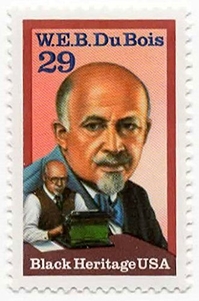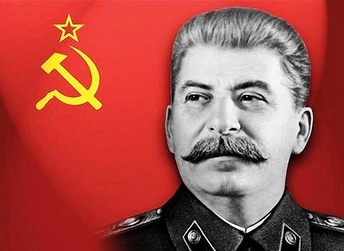In the end communism will triumph. I want to help bring that day.
— From W.E.B. DuBois's application for membership in the Communist Party, 1961

Next week, getting the year off to a lamentable start, the US Postal Service plans to issue a stamp commemorating W.E.B. DuBois, the eminent black writer, educator, and activist. This will be the second DuBois issue in six years. It is two too many.
A nation that produces stamps celebrating Marilyn Monroe and depicting the earth in a bathtub is a nation, we can agree, with pretty loose standards for postal honors. But at a minimum, the Postal Service ought to refrain from glorifying enemies of the United States. DuBois, who died in 1963 at the age of 95, was a man of many accomplishments. He was also a man who despised American democracy, renounced his US citizenship, and cheered the bloodiest tyrants of the 20th century. That should be enough to disqualify him from appearing on a US postage stamp.
It isn't as if the author of The Souls of Black Folk and Darkwater is in danger of being forgotten. DuBois's prolific writings are studied in a thousand and one college classrooms. A worshipful history of his first five decades won a Pulitzer in 1994. At least one public building has been named for him — the 26-story library of the University of Massachusetts at Amherst.
But some honors, at least, ought to be withheld from American intellectuals who bitterly slandered the United States and sang the (false) praises of its adversaries.
As US taxpayers were spending billions of dollars to rebuild a war-shattered Europe, DuBois proclaimed to an international communist convention that "of all nations of earth today, the United States alone wants war, prepares for war, forces other nations to fight and asks you and me to . . . commit suicide for a world war that nobody wants but the rich Americans who profit by it."
His anti-American propaganda was as crude as anything in Pravda. "The plea for peace comes today mainly from communists," he would write not long after secret Soviet missiles in Cuba had pushed the world to the edge of atomic war. "The spread of education and science comes from communists. . . . Is this why we hate communism and persecute its followers? The greatest threat of war comes from the United States and from its support of colonial imperialism."
In an era when few black Americans tasted privilege, DuBois knew fame, honor, and influence. He lived through the fall of Reconstruction and the rise of Jim Crow, yet he was able to earn college degrees (including the first Harvard PhD awarded to a black man), travel the globe, edit an important journal, lecture widely, and publish an astonishing number of essays and books. If any black American should have understood the potential of America's imperfect democracy to correct its failings and rectify its injustices, it was DuBois. Within his lifetime, after all, the Supreme Court handed down the infamous ruling in Plessy v. Ferguson — and overturned it in Brown v. Board of Education.
Yet the longer DuBois lived, the more he hated America. Harry Truman, he hissed, "ranks with Adolf Hitler as one of the greatest killers of our day." But Joseph Stalin, the butcher who slaughtered countless human beings and enslaved Eastern Europe behind an Iron Curtain, he eulogized as "a great man; few other men of the 20th century approach his stature. He was simple, calm, courageous."
This was no starry-eyed fellow traveler. DuBois traveled to the Soviet Union often and understood well the nature of the system he was exalting. He did not deny Moscow's deliberate starvation of 7 million Ukrainians, for example. He commended it. Those peasants had "clung tenaciously to capitalism and were near wrecking the revolution," he explained, so "Stalin . . . drove out the rural bloodsuckers."
No less did he admire Mao's murderous rule in China. The communist rape of Tibet — more than a million people killed, thousands of temples destroyed, sacred texts defiled, unspeakable tortures - evoked no sympathy from DuBois. "In Tibet," he recollected in his autobiography, "the landholders and slave drivers and the religious fanatics revolted against the Chinese, and failed as they deserved to. Tibet has belonged to China for centuries."
 DuBois eulogized Joseph Stalin, one of history's most notorious mass murderers, as "a great man . . . simple, calm, courageous." |
(In the same autobiography, DuBois reveled in the Soviet suppression of religion as "the Russian Revolution's greatest gift." It is a "moral disaster" to let parents teach children "so-called religious truth," he wrote. "We have to thank the Soviet Union for the courage to stop it.")
By 1961, DuBois was so repelled by the American system of democratic capitalism that he renounced his US citizenship and emigrated to Ghana. And he formally joined the Communist Party, hailing communism as "the only way of human life."
For devotion to the Stalinist cause, the Soviet Union awarded DuBois the Lenin Prize. For his willingness to whitewash every Maoist crime, Communist China once celebrated his birthday as a national holiday. When he died in Africa, the world's most notorious Marxist rulers paid him homage.
He turned his back on the civil rights movement at home and enthusiastically championed terrible dictators abroad. W.E.B. DuBois has had enough honors. The Postal Service ought not grant him another.
(Jeff Jacoby is a columnist for The Boston Globe).
-- ## --
Follow Jeff Jacoby on Twitter.
"Like" Jeff Jacoby's columns on Facebook.
Want to read more Jeff Jacoby? Sign up for "Arguable," his free weekly email newsletter.

